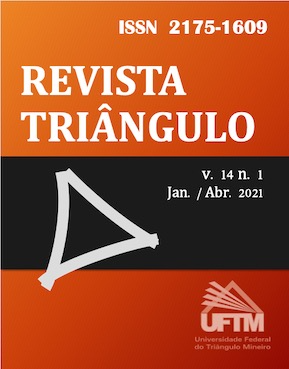Questions Of Collaboration, Engagement, And Belonging In Zoom And Blogs
DOI:
https://doi.org/10.18554/rt.v14i1.5470Palavras-chave:
Zoom. Collaborative Learning. Writing.Resumo
This piece argues for a combination of synchronous (Zoom) and asynchronous (blogs) classroom activities to in an upper-division writing class, with the goal of creating a space where students connected to peers, the teacher, and their work. Via a review of literature and semi-structured interviews with students, the author argues for a learner-centered approach that allows students to have a meaningful classroom experience during the realities of teaching online during the Covid-19 crisis.
Referências
Balinese, J.N. (2021). Nonverbal overload: A theoretical argument for the causes of Zoom fatigue. Technology, Mind, and Behavior (2)1. https://doi.org/10.1037/tmb0000030
Brame, C.J. & Biel, R. (2015). Setting up and facilitating group work: Using cooperative learning groups effectively. Vanderbilt University Center for Teaching. Retrieved [3/14/2021] from http://cft.vanderbilt.edu/guides-sub-pages/setting-up-and-facilitating-group-work-using-cooperative-learning-groups-effectively/.
Bruffee, K. A. (1984). Collaborative learning and the "conversation of mankind.” College English 46(7), 635-52.
Burke, A. (2011). Group work: How to use groups effectively. The Journal of Effective Teaching 11(2), 87-95.
Breuch, L. K. (2015). Chapter 11.Faculty preparation for OWI. In B.L. Hewett & K.E. Depew (Eds.), Foundational practices of online writing instruction (pp. 349-387). The WAC Clearinghouse.
CCCC committee for effective practices for online writing instruction. (13 March 2013). A Position Statement of Principles and Example Effective Practices for Online Writing Instruction. https://cccc.ncte.org/cccc/resources/positions/owiprinciples.
Cornelius-White, Jeffrey. (2007). Learner-centered teacher-student relationships are effective: A meta-analysis. Review of Educational Research 77(1), 113-143. https://doi.org/10.3102/003465430298563
Ehmann, C., & Hewett, B. (2015). Chapter 17.OWL Research Considerations. In B.L. Hewett & K.E. DePew (Eds.), Foundational practices of online writing instruction (pp. 517-545). The WAC Clearinghouse.
Elbow, P & Belanoff P. (1989). Sharing and responding. McGraw-Hill.
Famularsih, S. (2020). Students’ experiences in using online learning applications due to covid-19 in English classroom. Studies in Learning and Teaching 1(2), 112-121. https://doi.org/10.46627/silet
Inman, J.A. (2004). Computers and writing: The cyborg era. Taylor and Francis e-library.
Institutional Planning Research and Assessment. (2020) Remote learning survey—fall 2020. https://tinyurl.com/UCSBRemoteLearning2020
Kelly, S.M (27 March 2020). Zoom’s massive ‘overnight successes actually took nine years. https://www.cnn.com/2020/03/27/tech/zoom-app-coronavirus/index.html.
Mardiah, H. (2020). The use of E-Learning to teach English in the time of the Covid-19 Pandemic. English Teaching and Linguistics Journal 1(2), 49-55. http://jurnal.umsu.ac.id/index.php/ETLiJ
Orlich, D, et al. Teaching Strategies: A Guide to Better Instruction. Lexington, MA: D.C. Heath and Company, 1990.
Ray, R. (1992). Composition from the teacher-research point of view. In G. Kirsch & P.A. Sullivan (Eds.), Methods and Methodology in Composition Research (pp. 172-189). Southern Illinois University Press.
Ray, R (1996). Afterword: Ethics and Representation in Teacher Research. In P. Mortensen & G. Kirsch (Eds.), Ethics and Representation in Qualitative Studies of Literacy (pp. 287-300). NCTE.
Ruiz-Guerrero, A (2020). Our self-access experience in times of COVID. Studies in Self-Access Learning Journal. 11(3), 250–262. https://doi.org/10.37237/110311.
Selfe, C. L. (1988). Computers in the classroom: The humanization of computers: Forget technology, remember literacy. The English Journal 77(6), 69-71. https://doi.org/10.2307/818623
Williams, R. (2004). The non-designers design book: Design and typographic principles for the visual novice. 2nd ed. Peachpit Press.
Downloads
Publicado
Como Citar
Edição
Seção
Licença
Autores que publicam nesta revista concordam com os seguintes termos: Autores mantém os direitos autorais e concedem à revista o direito de primeira publicação, com o trabalho simultaneamente licenciado sob a Licença Creative Commons Attribution que permite o compartilhamento do trabalho com reconhecimento da autoria e publicação inicial nesta revista.




